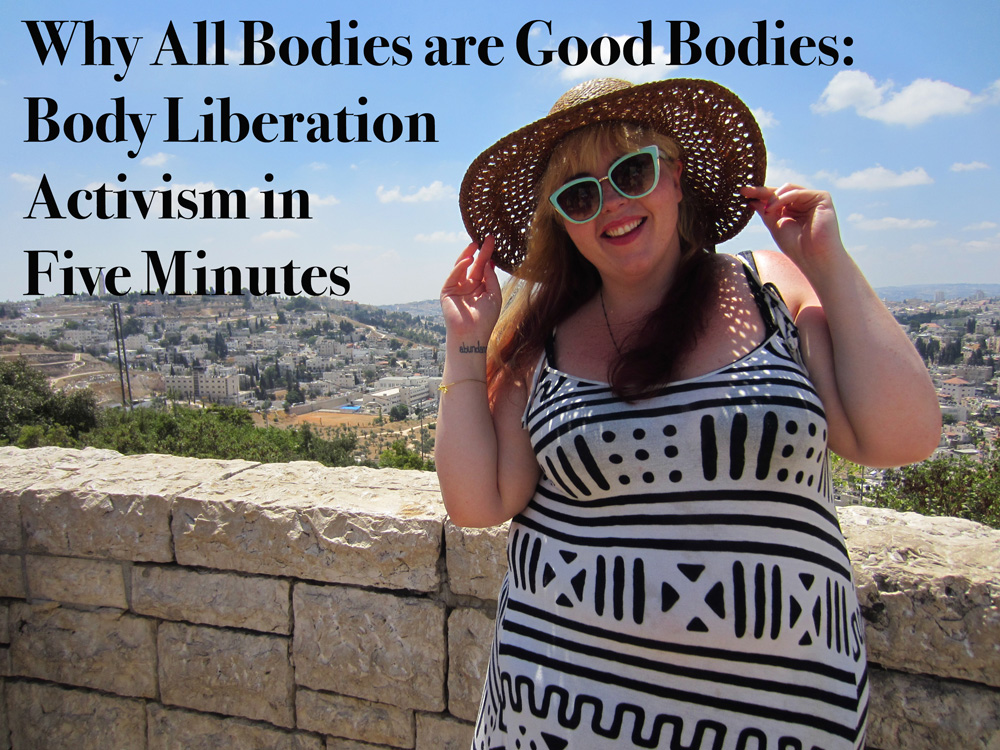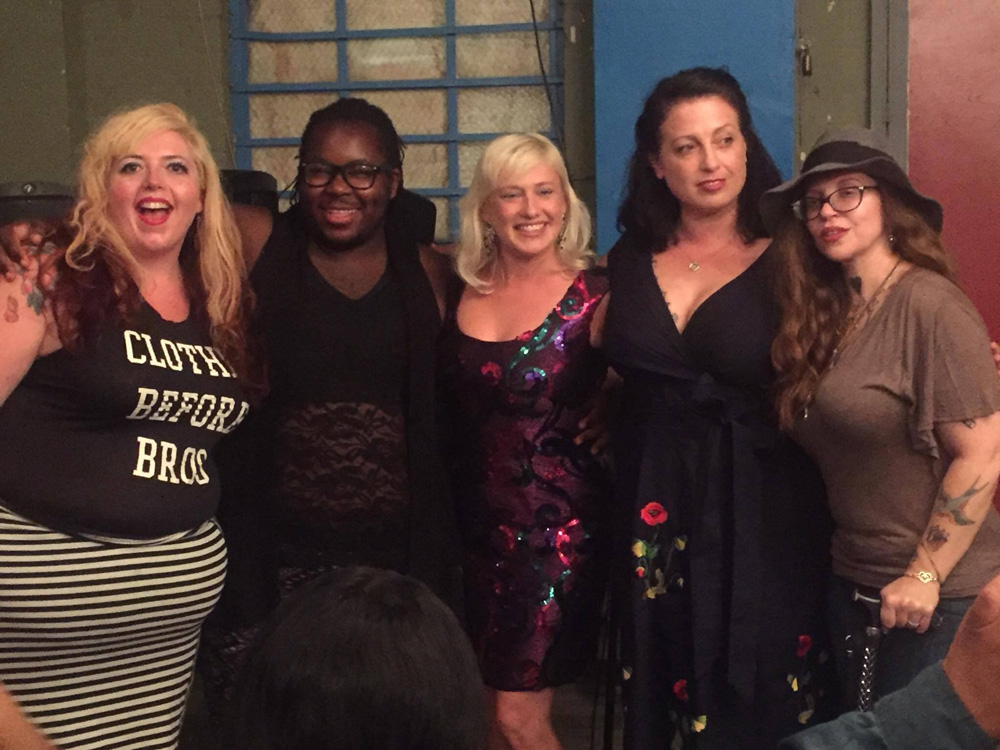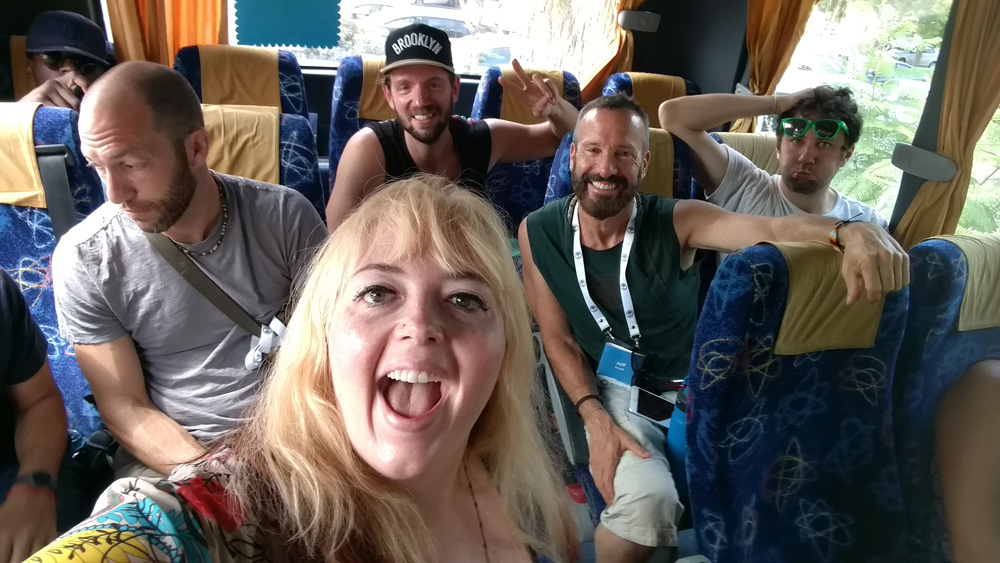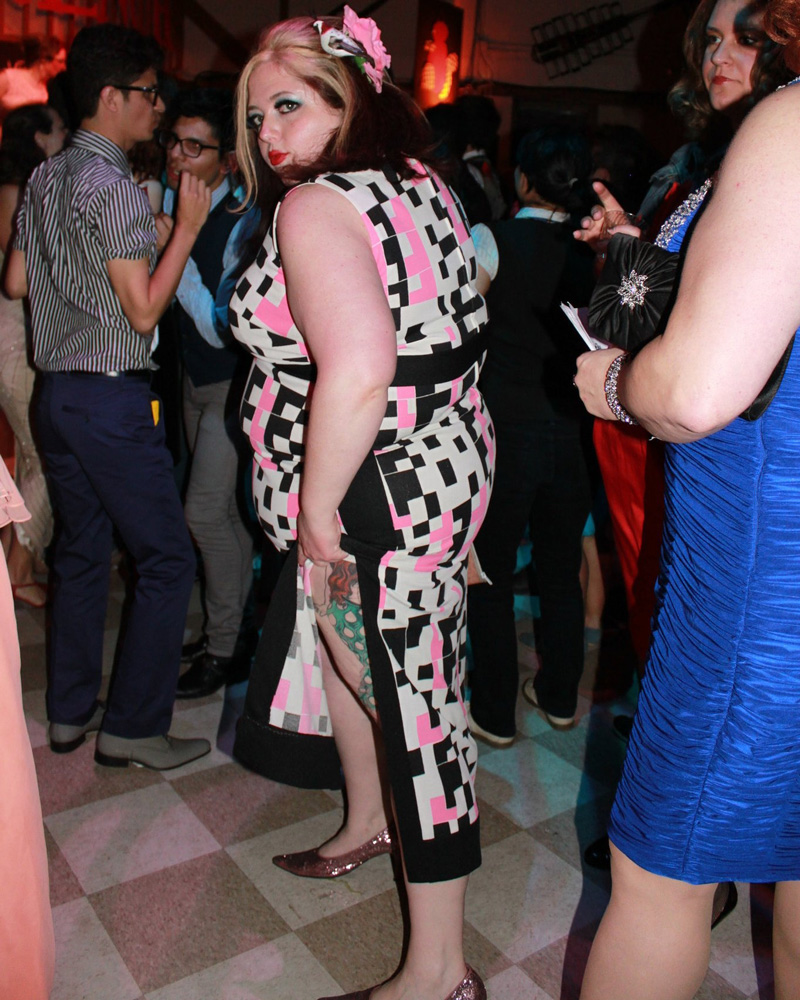On that trip of a lifetime earlier this month, (I’ve been home a week/can’t believe it’s already been a week!) the first group go around we said our name and something people could talk with us about. I have been in a lot of facilitated groups; this was the simplest and most effective go around for sparking individual conversations! Some people picked silly stuff and some people went more serious. I chose strategically because I knew the folks with whom I would engage with were global influencers, it was a rad opportunity to get to talk to them about body liberation activism!

What I did not expect was how sharp and quick my 2-5 minute spiel about body liberation activism would get when I delivered it 20 times! Sometimes it was one-on-one sitting next to each other on the bus, sometimes it was at dinner to a few folks, and then that time Jenna asked me about it I gave a full five minute workshop about it with a tiny cluster of curious Storytellers. Jenna and I continued a lengthy conversation about it for almost a whole day.
 Glamour from a place of a floppy hat, featuring Jenna, a totally brilliant, inquisitive babe/ardent feminist.
Glamour from a place of a floppy hat, featuring Jenna, a totally brilliant, inquisitive babe/ardent feminist.
To me Body Liberation Activism stems from a place where all bodies are valued equally. Think about our culture’s obsession with Body Currency, a concept coined by Jes Baker.
In a system of Body Currency, bodies are each assigned a specific value based on a metric of privileges and oppressions. Body size is one, so is age (and we’re literally all aging), ability (we’re literally all only temporarily able-bodied), race, class, religion, gender, binary gender conformity, flamboyance, expressions of sexuality, and how else we might be visibly or invisibly othered.
In a fatphobic society, all bodies are targeted and made to feel insecure. A fear of fat develops that results in epic amount of eating disorders and body shame. It creates a culture of conformity which benefits billion dollar cosmetics, diet and other industries that capitalize on our feelings of shame and unworthiness.
I focus on the semantics of “Body Liberation Activism” rather than just “Fat Activism” because I acknowledge that everyone is affected by this. Thin folks can use their privilege to act as an ally to fat folks, but when we dismantle systems of Body Currency we all win.
 I talked about how coming out as queer was affected by my experience with fat oppression in my piece in the Lambda Literary Award Winning anthology, Glitter and Grit. Here’s me and other brilliant contributors at the LA launch earlier this summer. Azure D. Osborne-Lee, Heather Ács, Anna Joy Springer and Meliza Bañales.
I talked about how coming out as queer was affected by my experience with fat oppression in my piece in the Lambda Literary Award Winning anthology, Glitter and Grit. Here’s me and other brilliant contributors at the LA launch earlier this summer. Azure D. Osborne-Lee, Heather Ács, Anna Joy Springer and Meliza Bañales.
To walk in alignment with Body Liberation is to disinvest from a system of Body Currency. Some places to start:
1. Cleanse the judgment palate.
When you find yourself judging someone else’s body or looks, stop yourself. Notice that you are doing it. Come up with a “thought palate cleansing” mantra, such as, “All bodies are good bodies.” “All bodies are worthy of love exactly as they are.” If you want to take to to the woo tip, “I see the light in that human. We are equal,” and actually imagine their golden light of humanity shining out of them.
2. Take your own inventory.
How are you loving your body? How are you talking to yourself about your body? Are you putting off living life or doing anything until you hit a goal weight? Are you talking shit about parts of your body? Commit to yourself to do the work to come into loving alignment with your body and your life will get exponentially happier, your activism will get more effective and folks in your life will absorb your values.
Body love doesn’t happen overnight, it’s a series of brainwashing to unlearn the lies our culture tells us about our bodies. I started this work at 22 years old, after 15 years I’m still doing the work, but now loving myself is a reflex.
 World Famous *BOB* and Tammy Cannons are performing with me this Saturday at Dollypalooza NYC!
World Famous *BOB* and Tammy Cannons are performing with me this Saturday at Dollypalooza NYC!
3. Speak up for other folks.
I love to gently remind people how they can use their privilege. (I prefer gentle consciousness raising to “calling out,” I find it wildly more effective.) My bestie Rachael told me once that she feels like a thin secret agent among other thin people when she hears body shaming going down. That is a great place to consciousness raise.
If you hear your thin friends talking shit about other bodies or talking shit about their own bodies, that is a great time to step in and say something like, “I believe that all bodies are good bodies.” Or drop knowledge bombs like describing the system of Body Currency and how it hurts everyone.
You can also talk about your friend Bevin’s work to help people love their bodies no matter their size. I know a lot of folks who amplify my work as a way of being an ally and I think it really helps to not have to take a full “stand” or argue, but simply to talk about different ideas.
 Just some of the back of the bus crew. I have about 2400% more straight male friends than I did before this trip. We had great convos!
Just some of the back of the bus crew. I have about 2400% more straight male friends than I did before this trip. We had great convos!
4. Don’t comment on other people’s bodies.
Well intentioned people act in fatphobic ways all the time! I take it as a total nonpliment when people tell me I look so good when I’ve lost weight! Gross! I was hot before, still hot now. Being body neutral means not commenting on people’s bodies even when that is so ingrained in our culture and it’s haaaard. Try just complimenting them on their hair or their outfit if you are trying for a fast save. (Read all about it in my post How to Be a Good Ally to Fat People Who Appear to Have Lost Weight.)
This is also true for how you interact with young people. Girls are told they are pretty and boys are told they are brave. We condition kids to perpetuate these ideas that a girl’s value is in their looks and a boy’s value is in their ability to hide their feelings and be “tough.” Kids are also sponges, refraining from talking about other people’s bodies in front of them, especially your own is a big deal! I learned a lot of body self-loathing from well intentioned and loving adults in my life. Being conscientious about body talk around kids is like waving a magic wand for their current and future self esteem.
 I had to do so much work around my body to be okay with Visible Belly Outline. But now it’s a THING OF REVOLUTION and there are whole articles about it! Photo by Morgan Hart, Rebel Cupcake 2012.
I had to do so much work around my body to be okay with Visible Belly Outline. But now it’s a THING OF REVOLUTION and there are whole articles about it! Photo by Morgan Hart, Rebel Cupcake 2012.
5. Remember your ally tools.
People see fat folks, queers, people of color, women, non binary gendered people, older folks, disabled folks, etc… as less than. They often love to speak FOR them. Do that when you’re alone (see #3 above) but when in a group with folks whose bodies are differently valued than yours, help to amplify those voices.
If you’re a man and you want to talk about amplifying women’s voices, make sure you aren’t interrupting or talking over women. Learn about mansplaining and don’t do it. If a woman has asked a question in a crowd and it’s getting ignored (I witnessed that on my trip), use your privilege and ask the speakers to address the question. If a fat person is around and talking about fat oppression, if a person of color is talking about an experience of oppression, etc… your job as an ally is to listen and amplify.
It’s also not your job to “save” self loathing fat folks! Sometimes thin people are the BEST allies because the notion that someone with body privilege is valuing your body is really thrilling, but for some fat folks talking about bodies is really triggering and they’re not ready for it. It’s okay to gently say you believe all bodies are good bodies when a fat person talks shit about their body to you, but if they are fighting back, let them have their own process around it. In that vein…
6. Body autonomy is important.
Listen, not all fat people are fat and happy. Thanks to a fatphobic society we’re taught to hate our bodies. We’re also a culture that prioritizes a diet of starchy bullshit that does unkind things to bodies that involves inflammation, persistent chronic health disorders and sometimes weight gain. (Remember a thin person can be less healthy than a fat person, a lot of fat experience is due to genetic lottery.)
Everyone is going to have their own goals about their body and maybe that includes weight loss goals. I am totally in support of people’s body autonomy and goals. But think about who you are talking to about your body goals and your issues with your body.
Fat people (especially Fat women and Fat Femmes) are often targeted for uncompensated emotional labor around bodies. How shitty would it feel for a fat friend of yours to hear about how much you don’t like your fat. As someone who has worked hard to step away from body policing and negative body talk, I am astounded at how many fat people I know who hear it from friends in their own body policing.
Get consent BEFORE you talk about your body with anyone, and especially fat folks and then pay attention to non verbal cues about someone actually not being comfortable talking about it. You never know when you’re potentially triggering someone out about an eating disorder or body trauma.
And dear Goddess, if you are a thin or thinner person dating a fat person, don’t talk shit about your body to them! Get your emotional support for your body weight fluctuations from outside of your relationship. It is so hard to be vulnerable with your body sexually; an empowered person is a lion in the sack, but a disempowered person cannot roar. (More on this in Seven Ways to Be an Ally to Your Fat Lover.)

Ready for more? Here are some great resources:
My boo Kelli Jean Drinkwater’s TED talk, “The Fear of Fat, the Real Elephant in the Room.” (I have a draft of one, too, if anyone knows of a TED event I should apply to let me know!)
The Body Is Not an Apology, founded by Sonya Renee Taylor, fosters global, radical, unapologetic self love which translates to radical human love and action in service toward a more just, equitable and compassionate world.
The Fat Activism Conference in September is going to be amazing! It’s virtual so you can do it from anywhere.
Jes Baker‘s book Things No One Will Tell Fat Girls.
Other hits people have liked from my blog that amplify body liberation:
Nine Steps to Be Able to Wear Sleeveless Shirts by Next Summer
I Lost a Bunch of Weight and Feel Really Complicated About It
Five Steps to Learn to Love Your Body Now
Six Strategies to Not Care When People Stare at You
